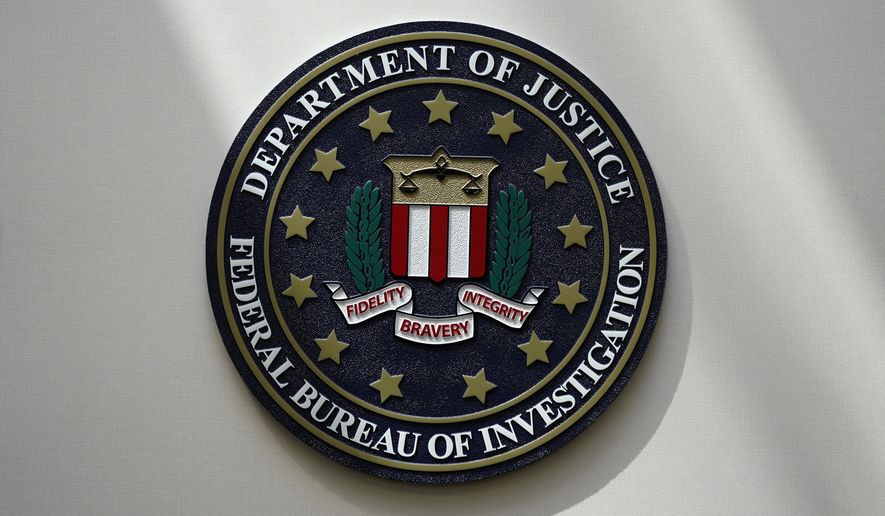A senior FBI official Brian Auten was hammered by prosecutors and defense lawyers on Wednesday when he took the stand in the trial of Russian analyst Igor Danchenko, who is accused of lying to federal agents about information he provided for an anti-Trump dossier.
Both sides said FBI agents failed to scrutinize Mr. Danchenko and plowed ahead with the Trump-Russia collusion investigation in 2016.
Special prosecutor John Durham, who brought the case as the last act of his three-year probe of the origins of the FBI’s Trump-Russia investigation, lambasted Mr. Auten and bureau officials for accepting information from Mr. Danchenko.
Mr. Danchenko was a prime source for British ex-spy Christopher Steele’s salacious and unverified dossier detailing Mr. Trump’s ties to Russia.
Defense lawyers, on the other hand, blasted Mr. Auten and his FBI colleagues for asking Mr. Danchenko vague questions with virtually no follow-ups. They said the lack of direct questions landed Mr. Danchenko in hot water with the special counsel’s team.
Mr. Danchenko is on trial in Alexandria, Virginia, on five charges of lying to the FBI agents who interviewed him in 2017 about how he gathered information that ultimately ended up in the Steele dossier.
SEE ALSO: Goals of Danchenko, Clinton ally ‘coincided,’ FBI agent says
The FBI used the unconfirmed information in the dossier to secure approval of a Foreign Intelligence Surveillance Application warrant to monitor Trump campaign figure Carter Page, according to Mr. Auten’s testimony. That warrant was renewed three times based on the same, unverified claims.
Mr. Durham zeroed in on anti-Trump information in the report that purportedly came from Sergei Millian, the former president of the Russian American Chamber of Commerce.
Prosecutors say Mr. Danchenko deceptively told FBI officials that Mr. Millian was a source of information based on a phone call that never happened. Defense attorneys say their client told agents he wasn’t sure if the call came from Mr. Millian so he didn’t lie.
Both sides made it clear in court that the FBI should have done more to confirm the phone call.
Mr. Danchenko’s legal team said the claims in the dossier about former President Donald Trump were based on a 15-minute anonymous phone call their client had with someone he believed to be Mr. Millian in 2016.
Jurors were shown emails and other information that depicted Mr. Millian as a Trump supporter.
Mr. Durham asked Mr. Auten if he found it “peculiar” that a backer of the former president would be pitching negative gossip tying Mr. Trump to Russia. When Mr. Auten responded that it was, indeed, peculiar, Mr. Durham fired back that it was “unbelievable.”
Mr. Durham remained on the attack, getting Mr. Auten to admit that agents didn’t look at phone records to verify Mr. Millian had actually made the call or pull travel records to back up claims that he traveled to New York for a meeting with Mr. Danchenko.
Defense attorneys said that after the anonymous phone call, Mr. Danchenko spent two days in New York awaiting a meeting with Mr. Millian that never happened.
“You took the information from the dossier and put it in the FISA application and it didn’t come from Sergei Millian,” Mr. Durham said. “You believed it was coming from Sergei Millian based on what Igor Danchenko told you.”
Danny Onorato, one of Mr. Danchenko’s attorneys, pressed Mr. Auten, about why investigators were not more curious during their days interviewing their client in January 2017.
When Mr. Auten described Mr. Danchenko as “unsure” who called him pitching anti-Trump dirt, the defense attorney wanted to know why he wasn’t pressed for a more direct answer.
“There was much more we could have asked during the interview,” Mr. Auten admitted.
He later said the interviews were more about “breaking the ice” with Mr. Danchenko rather than eliciting new information for the Trump-Russia probe.
Mr. Auten also acknowledged that agents could have asked for Mr. Danchenko’s phone or email password in an attempt to verify his claims, two steps he said did not happen. He also said that he did not believe agents pulled Mr. Millian’s travel records to see if he was in New York at the time of the meeting or when Mr. Danchenko received the anonymous phone call.
He said he couldn’t think of a good reason why investigators didn’t take those steps, prompting a strong rebuke from Mr. Durham.
“You didn’t have any corroborating evidence from any databases, or from other intelligence agencies, or from Mr. Steele, and it still went into the [FISA] affidavit?” he asked.
• Jeff Mordock can be reached at jmordock@washingtontimes.com.




Please read our comment policy before commenting.